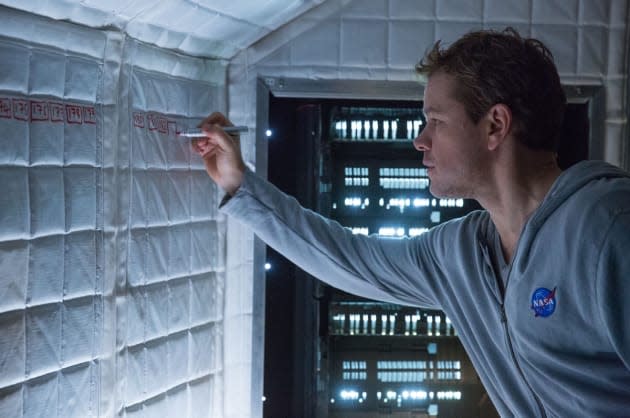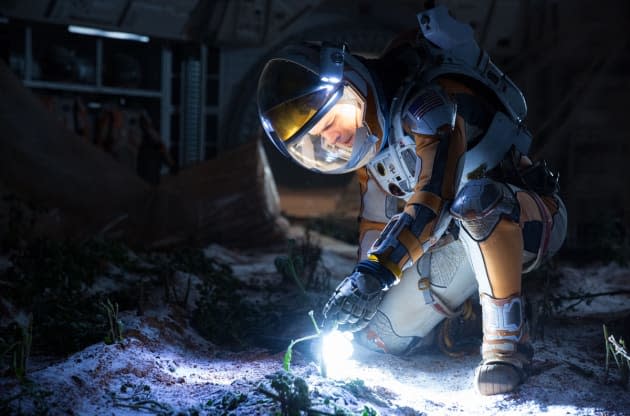'The Martian' is a reminder we're all in this together
For a film that's centered on one unfortunate astronaut marooned on Mars, Ridley Scott's The Martian (based on the wildly successful Andy Weir novel) is far more than just one man's story. Ultimately, it's about humanity coming together to attempt something impossible. Mark Watney, played by Matt Damon, is smart enough to figure out how to survive alone on Mars, for a while, at least. But to get back home, he'll need help from Earth's brightest minds — and that doesn't just mean NASA. One of The Martian's most affecting scenes is when two typically antagonistic groups learn to put aside old conflicts and work together. For science. It's something to keep in mind as we face bigger, planet-shifting, humanity-wide issues throughout the twenty-first century.
The driving force behind The Martian is a positive, "can do" attitude towards science and problem solving. Mark Watney isn't exactly a realistic interpretation of what an astronaut would do when stranded millions of miles from Earth, with limited supplies and no hope for a quick rescue. (Damon's similarly stranded character in Interstellar might be a more fitting example of that.) Instead, he is our ideal — an indefatigable survivor with the botany skills to grow crops on a barren planet, and the engineering chops to create water from rocket fuel. He's MacGuyver, on Mars.

Back on Earth, NASA scrambles to come up with a way to save Watney once they realize he's still alive. And once again, that "can do" attitude comes into play. There's still the usual governmental bureaucracy to fight through — embodied by Jeff Daniels' NASA administrator — but as the stakes continue to rise, the importance of acting decisively quickly becomes clear. Timelines get pushed up. Engineers come up with entirely new strategies on the fly. Everyone works harder than they ever have before. We haven't seen NASA this heroic since Apollo 13.
Not everything comes easy, though. There's a huge (and necessary) debate on whether it's even worth devoting resources to saving one man. Daniels' stodgy NASA suit points out that any failure could be a huge blow to future space missions. Just look at how catastrophes like the Challenger explosion affected NASA, and any rational personal would realize he has a point. On the more optimistic side is Vincent Kapoor (played by Chiwetel Ejiofor), who argues that it's their duty to at least attempt a rescue. And there's also the remainder Watney's flight crew on the Hermes, a spacecraft returning to Earth from Mars, who would naturally jump at the chance to risk their lives and save their colleague.
Really, there isn't much of a choice. Mark Watney isn't just one man — he is an extraordinary one, the culmination of the totality of humanity's achievements trapped on a desert planet. And if we don't at least try to save him, what's the point of this whole civilization thing, anyway?

Similar to Interstellar (which also shares a few cast members), The Martian presents an idealized version of space travel. It's far more believable though, because Andy Weir based most of the book on technology that already exists or will soon be finished. There's no need for mysterious wormholes leading to distant galaxies with a giant black hole in the center here. It's also a slightly more convincing argument for space travel. The world isn't on the brink of destruction — we're just pushing our innate desire to explore.
Sure, it's all a bit sappy, but The Martian is a refreshing change from our current sci-fi obsession with the end of the world. It's akin to what Gene Roddenberry wanted to convey with Star Trek — by working together, we'll be able to explore uncharted reaches of space, and hopefully better understand what it means to be human. And you can bet that just as Star Trek inspired countless kids to pursue science and engineering, The Martian will have a similar affect on a new generation.
As a culture, we champion the geniuses — the Steve Jobs, the Elon Musks. But we often forget that their greatest accomplishments are due to a team of brilliant people working together to change the world. Forget hero worship, we should be worshipping the collective power of humanity to do good.
[Photo credits: Aidan Monaghan, Giles Keyte/Twentieth Century Fox]
